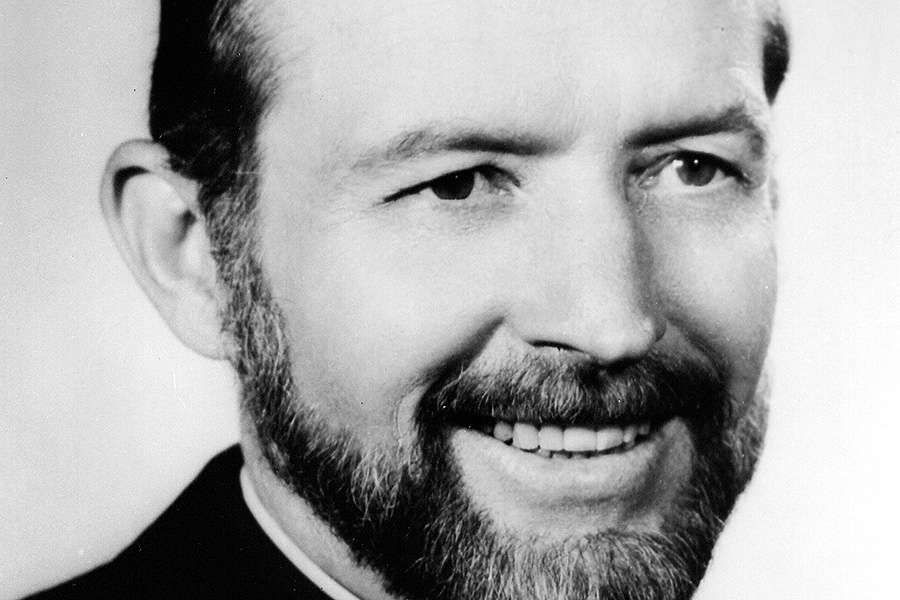Oklahoma City, Okla., May 18, 2017 / 06:01 am (CNA/EWTN News).- The remains of Venerable Stanley Rother were exhumed last week and moved to a chapel in Oklahoma City in preparation for the beatification Mass of the first US-born martyr.
“The witness of Father Rother’s life and death has been a source of encouragement and inspiration to me as a seminarian, priest and now as a bishop. I consider it a great gift to be entrusted with overseeing the continuation of his cause for beatification and canonization begun by Archbishop Beltran,” Archbishop Paul Coakley of Oklahoma City said after the May 10 service. “His beatification is an unexpected blessing for Oklahoma and for the United States as we celebrate this ordinary man from humble beginnings who answered the call to serve an extraordinary life. His witness will continue to inspire us for generations.”
The body of Fr. Rother, who served as a priest in Guatemala, was taken from Holy Trinity Cemetery in his home town of Okarche, Okla., to the chapel at Resurrection Cemetery in Oklahoma City. Before his body was exhumed, his family led a prayerful procession to the gravesite.
Fr. Rother's remains were later removed form the vault, and examined by medical professionals and verified, as required by the process of beatification. The martyred priest's body was then placed in a new casket with golden vestments, along with a document signed by those in attendance. A ribbon was wrapped around the casket, sealed with the archdiocese's seal in wax. The Salve Regina was sung as the casket was re-interred, and a prayer service followed.
“It was a holy day. Father Rother’s presence was felt by many, and we are blessed as the Catholic Church in Oklahoma to present Father Rother’s life to the world,” Archbishop Coakley commented. A temporary sign now marks Fr. Rother's original gravesite in Okarche, located about 40 miles northwest of Oklahoma City, where the original vault and casket have been re-buried, and a permanent memorial marker is planned.
Fr. Rother's Mass of Beatification will take place Sept. 23 at the Cox Convention Center in Oklahoma City. It will be said by Cardinal Angelo Amato, prefect of the Congregation for the Causes of Saints, and concelebrated by Archbishop Coakley.
Fr. Rother was born March 27, 1935 in Okarche and entered seminary soon after graduating from Holy Trinity High School. Despite a strong calling, Rother would struggle in the seminary, failing several classes and even out of one seminary before graduating from Mount St. Mary's in Maryland. He was ordained a priest of the Diocese of Oklahoma City and Tulsa in 1963. He served for five years in Oklahoma before joining the Oklahoma diocese's mission in Santiago Atitlan, Guatemala, a poor rural community of mostly indigenous persons where he would spend the next 13 years of his life.
The work ethic Fr. Rother learned on his family’s farm would serve him well in this new place. As a mission priest, he was called on not just to say Mass, but to fix the broken truck or work the fields. He built a farmers' co-op, a school, a hospital, and the first Catholic radio station.
Over the years, the violence of the Guatemalan civil war inched closer to the once-peaceful village. Disappearances, killings, and danger soon became a part of daily life, but Fr. Rother remained steadfast and supportive of his people. In 1980-1981, the violence escalated to an almost unbearable point; Fr. Rother was constantly seeing friends and parishioners abducted or killed.
In January 1981, in immediate danger and his name on a death list, Fr. Rother did return to Oklahoma for a few months. But as Easter approached, he wanted to spend Holy Week with his people in Guatemala. The morning of July 28, 1981, three Ladinos, the non-indigenous men who had been fighting the native people and rural poor of Guatemala since the 1960s, broke into Fr. Rother's rectory. They wished to disappear him, but he refused. Not wanting to endanger the others at the parish mission, he struggled but did not call for help. Fifteen minutes and two gunshots later, Father Stanley was dead and the men fled the mission grounds.
Though his body was buried in Okarche, Fr. Rother's heart was enshrined in the church of Santiago Atitlan where he served. Fr. Rother's cause for beatification was opened in 2007, and his martyrdom was recognized by the Vatican in December 2016, which cleared the way for his beatification.

